牛津译林版英语必修一Unit2Wordpower教案
牛津译林版英语必修一Unit2Wordpower教案
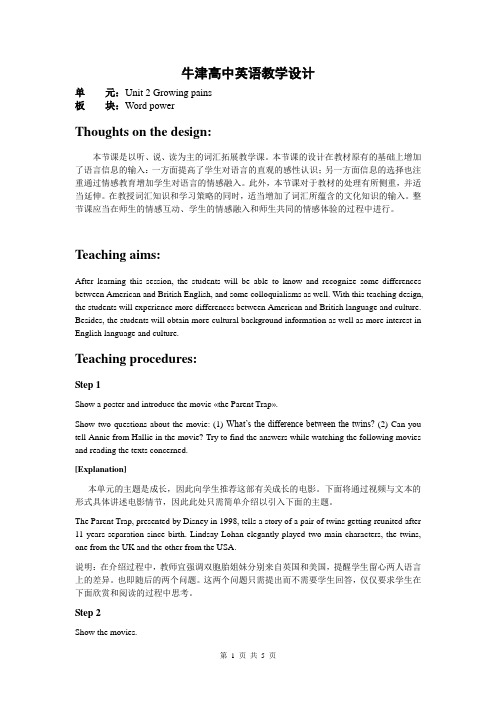
牛津高中英语教学设计单元:Unit 2 Growing pains板块:Word powerThoughts on the design:本节课是以听、说、读为主的词汇拓展教学课。
本节课的设计在教材原有的基础上增加了语言信息的输入:一方面提高了学生对语言的直观的感性认识;另一方面信息的选择也注重通过情感教育增加学生对语言的情感融入。
此外,本节课对于教材的处理有所侧重,并适当延伸。
在教授词汇知识和学习策略的同时,适当增加了词汇所蕴含的文化知识的输入。
整节课应当在师生的情感互动、学生的情感融入和师生共同的情感体验的过程中进行。
Teaching aims:After learning this session, the students will be able to know and recognize some differences between American and British English, and some colloquialisms as well. With this teaching design, the students will experience more differences between American and British language and culture. Besides, the students will obtain more cultural background information as well as more interest in English language and culture.Teaching procedures:Step 1Show a poster and introduce the movie «the Parent Trap».Show two questions about the movie: (1) What’s the difference between the twins? (2) Can you tell Annie from Hallie in the movie? Try to find the answers while watching the following movies and reading the texts concerned.[Explanation]本单元的主题是成长,因此向学生推荐这部有关成长的电影。
高中英语Module1Unit2GrowingpainsWordPower(2)教案牛津泽林版必修1
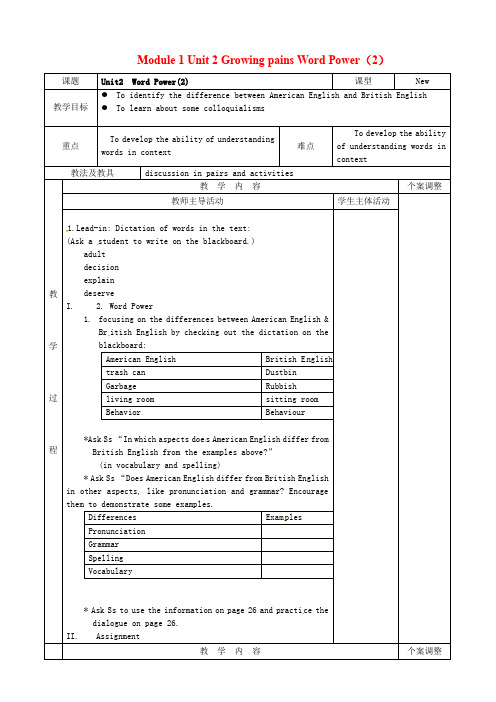
If we don’t win this basketball game by at least twenty p oints,
I will eat my hat.
Meaning: a saying used when you are 100 percent certain that
something will happen
重点
To develop the ability of understanding words in context
难点
教法及教具
discussion in pairs and activities 教学内容
教师主导活动
To develop the ability of understanding words in context
学生主体活动
个案调整
1.Lead-in: Dictation of words in the text:
(Ask a student to write on the blackboard.)
adult
decision
explain
教
deserve
I. 2. Word Power
1. focusing on the differences between American English &
* Ask Ss to use the information on page 26 and practi ce the dialogue on page 26.
II. Assignment 教学内容
个案调整
教师主导活动
1.
What is a colloquialism? How is it used?
牛津译林版高中英语必修一Unit 2《Growing pains》(Word Power)教案1
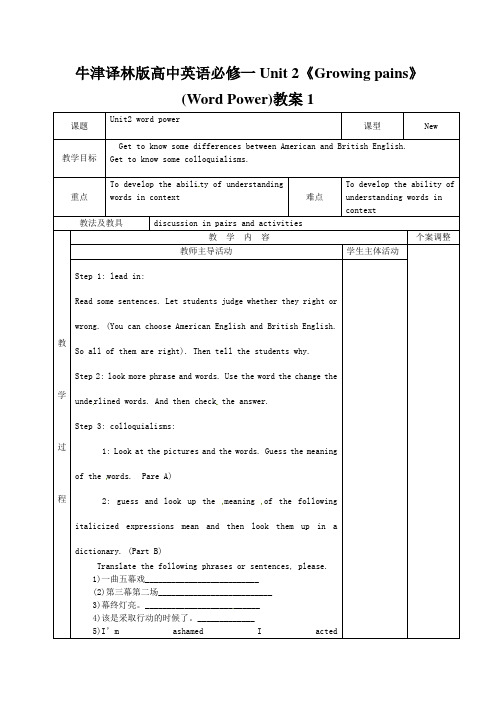
牛津译林版高中英语必修一Unit 2《Growing pains》(Word Power)教案1课题Unit2 word power课型New教学目标Get to know some differences between American and British English. Get to know some colloquialisms.重点To develop the abili ty of understandingwords in context 难点To develop the ability ofunderstanding words incontext教法及教具discussion in pairs and activities教学过程教学内容个案调整教师主导活动学生主体活动Step 1: lead in:Read some sentences. Let students judge whether they right orwrong. (You can choose American English and British English.So all of them are right). Then tell the students why.Step 2: look more phrase and words. Use the word the change theunde rlined words. And then check the answer.Step 3: colloquialisms:1: Look at the pictures and the words. Guess the meaningof the words. Pare A)2: guess and look up the meaning of the followingitalicized expressions mean and then look them up in adictionary. (Part B)Translate the following phrases or sentences, please.1)一曲五幕戏__________________________(2)第三幕第二场__________________________3)幕终灯亮。
牛津译林版高中英语必修1Unit 2Growing painsWord power学案2

Module 1 Unit 2 Growing pains-word power学案Words:vacation n.假期,休假curtain n.窗帘sink n.水池,水槽,洗碗池garbage [U] 垃圾leave vt.使……处于某种状态,听任forbid v. (forbad(e), forbidden) 禁止scene n.(戏剧的)一场;场面;景色grandparent n.祖父(母);外祖父(母)mark n.分数;标志;记号period n.时间段,时期,阶段selfish adj.自私的suggest v.建议;暗示,使想起suggestion n. 建议behaviour n.行为behave v. (行为或举止)表现interest v.使……感兴趣interesting adj.有趣的,有意思的interested adj.感兴趣的explain v.解释explanation n. 解释touch v.触摸touched adj.感动的touching adj.感人的,令人感动的explain v.解释explanation n.解释reason n.理由reasonable adj.合乎情理的unreasonable adj.不合乎情理的punish v.惩罚punishment n.惩罚unpunished adj.免受惩罚的go unpunished没受惩罚bore v.使厌倦bored adj.感到厌倦了的boring adj.令人厌倦的mix v. 混合;混淆mixture n.混合物value n.价值valuable adj.宝贵的,有价值的n.贵重物品valueless adj.不值钱的,没有价值的argue v.争论argument n.议论,争论,论点freedom n.自由free adj.自由的;有空的true adj.真诚的,真实的truly adv.Useful expressions:be supposed to do sth. 应该做……,被期待做某事be in charge of sth. 负责某事be in one’s charg e / be in the charge of sb. 由某人负责punish sb. for sth. /for doing sth 因(做)某事而惩罚某人argue with sb. about/over sth. 与某人争论某事,就某事和某人争吵be upset about / over sth. 为……而感到心烦意乱make a difference 产生差异,使有所不同,起重要作用forbid sb. to do sth. / forbid sb. from doing doing 禁止某人做某事What’s up? 怎么了?be hard on sb. 对某人苛刻in the form of a dialogue 以对话的形式should have done sth. 本应该做某事而未做followed by a big dog 身后跟着一条大狗go unpunished 饶过;没被惩罚can’t wait to do sth. 迫不及待地做某事have one’s arms crossed 双臂交叉turn up the radio a little 把收音机音量开大一点leave out 漏掉after all 毕竟;别忘了at present 目前,当前like crazy 发疯似地,拼命地do sth. like crazy疯狂地干某事in one’s spare time 在某人业余时间里keep sth. in mind 牢记……be meant to be / mean … to be 本意为in a mess 处于混乱状态go out (灯)熄灭do with 处理now that 既然,由于insist on坚持get the room tidied up 把房间整理好clean up收拾干净the only child 独生子deserve to do sth. 配得上做某事not … any more不再,再也不as though 似乎,好像have a good laugh over对……大加嘲笑mix up 混淆,混合be related to和……有关系of great value有很大价值Internet café网吧be proud of 以……为自豪stay up late 不睡觉,熬夜到很晚fail (in) the Maths test 没有通过数学测试be proud of 以……为自豪take / follow one’s advice 接受某人的忠告stay up late 不睡觉,熬夜到很晚fail (in) the Maths test 没有通过数学测试take / follow one’s advice 接受某人的忠告prevent sb. from doing sth.阻止某人做某事waste some time doing sth. 浪费时间做某事refuse to do sth. 拒绝做某事I. Vocabularysurprise vt.使惊奇,是震惊[U] 惊奇,诧异[C] 使人吃惊的事,出人意料surprised adj.“感到惊讶的”,指某人对某事感到震惊surprising adj.“使人惊奇的;惊人的”,事物本身令人惊讶则用surprising[搭配]be surprised at …对……感到吃惊in surprise惊奇地to one’s surprise使某人吃惊的是1. ______ ( surprise ) at the ________ (surprise ) news, the _______ (surprise ) student said with a _________ (surprise ) look, “It’s really very ________ (surprise )”.2. The ______ look on his face suggested he ______ that.A. surprised; wouldn’t have expectedB. surprising; hadn’t expectedC. surprising; would expectD. surprised; hadn’t expected3. 使我感到惊奇的是,我父亲对这个令人震惊的消息并不感到惊讶。
译林牛津英语必修1Unit2GrowingpainsWordpower学案
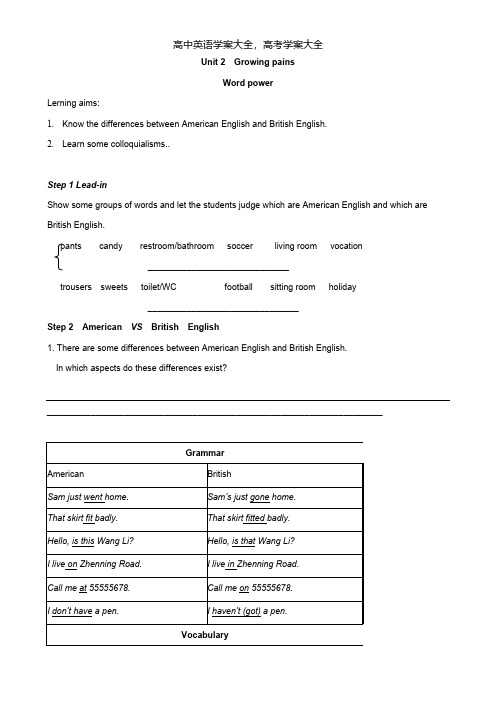
Unit 2 Growing painsWord powerLerning aims:1.Know the differences between American English and British English.2.Learn some colloquialisms..Step 1 Lead-inShow some groups of words and let the students judge which are American English and which are British English.pants candy restroom/bathroom soccer living room vocation_____________________________trousers sweets toilet/WC football sitting room holiday_______________________________Step 2 American VS British English1. There are some differences between American English and British English.In which aspects do these differences exist?_____________________________________________________________________GrammarAmerican BritishSam just went home.Sam’s just gone home.That skirt fit badly.That skirt fitted badly.Hello, is this Wang Li?Hello, is that Wang Li?I live on Zhenning Road.I live in Zhenning Road.Call me at 55555678.Call me on 55555678.I don’t have a pen.I haven’t (got) a pen.VocabularyAmerican Britishcandy sweetspants trouserssoccer footballvacation holidaygarbage rubbishrestroom/bathroom toilet/WCSpellingAmerican Britishcenter centrecolor colourtraveler travellerbehavior behaviourorganize organise/organizeprogram programmePronunciationAmerican Britishanswer [æ]answer [ɑ:]Of course. [kɔːrs]Of course. [kɔːs]box [bɑːks]box [bɒks]2. Despite such differences, all English speakers, Americans or Englishmen, can understand each other.Besides language, can you name any other differences between the cultures of the USA and the UK? Brain-storm: How much do you know?1) Thanksgiving is observed only in ___________.2) People usually walk on the ________ side in the USA while in the UK people usually walk on the_____ side.3) _____________ behave in a more casual way while in __________people are a bit more formal or traditional.4) Americans select ________ as the top leader of the country, while in the UK, the ___________ or_________ is always the representative of the country.5) Football has its origin in ________, but in America, where it is called __________, it is not so popular as American football, or _______.Step 3 Practice 11. Use the information from what you have learnt to change the underlined words and phrases from American to British English.Li Hua:Hello, (1) Is this ___________ Dai Jun?Dai Jun:Yes. Hi, Li Hua, how are you?Li Hua:I’m okay now, but I just had the worst morning ever!Dai Jun:What happened?Li Hua:I went to the shopping (2) center __________ near Huaihai Road, to change the new shoes I bought, the ones that (3) fit ________ badly, for bigger ones. One saleswoman was in the (4)bathroom _________ and the other was watching a TV (5) program _ __________ behind the counter. Neither of them would help me! Finally, I got help, but they only had the shoes in a (6) color __________ I didn’t like. I wanted to complain , but when I asked to see the manager,they told me, oh, sorry, (7) she just went home_ _____________________________.Dai Jun: What a terrible shop! What did you do ?Li Hua:They gave a number to phone the manager(8) at _______, so I called when I got home. Now I feel a bit better, but I still don’t have new shoes!2. Ask Ss to tell if they are American or British English. (AE/BE)1) —Have you got any pets?—Yes, I’ve got three rabbits and a tortoise. ____________2) I have an apartment in the city centre. ____________3) Do you have a walkman?____________Have you (got) a walkman?____________4) I don’t have any ink. ____________I haven’t (got) any ink. ____________5) She works nights as a janitor. ____________She works at night as a janitor. ____________6) Let’s stay home. ____________Let’s stay at home. ____________7) He has gotten a new job. ____________He has got a new job. ____________3. Tell a story: After the story, you are required to answer several questions:Joe—an AmericanNancy—an EnglishmanOnce Joe came to Britain for the first time by air. When he arrived at Nancy’s home. He asked, “ Could I use your bathroom?” Nancy said ok and gave him a cleantowel and told him that the bathroom was upstairs. After a while, however, Joe didn’t find the bathroom. Question 1: What is it that Joe can’t find in the bathroom?____________________________________________________.Question 2: Why can’t he find it?________________________________________________________________________________ _________________________________________________.Step 4 Colloquialisms1. What is a colloquialism?A colloquialism is an informal expression used in spoken English. Colloquialisms are often used inconversations.In many cases, we can guess the meaning of the colloquialisms through the words used.2. Match the two columns:1) Don’t worry. It’s a piece of cake!2) Don’t be a wet blanket.Have some fun!3) Go on, tell me. I’m all ears.4) Are you serious? Don’t pull my leg.3. Guess the meaning of the underlined:1) Mrs. Black’s garden is the best in our town. She has real green fingers.______________________________________________2) He just can’t do anything right. He is all thumbs._______________________________________________3) You are telling me I’m lazy. Ha, look what a mess your room is! That’s likethe pot calling the kettle black!____________________________________________4) I wish I had brought my umbrella. It’s raining cats and dogs._____________________________________5) Don’t make a mountain out of a molehill. It’s not that serious._________________________________________________6) He makes every decision in our company. He is the top dog.________________________________________________7) Why did you give her the cold shoulder? You are good friends, aren’t you?_______________________________________________8) Football is just not my cup of tea –--- I like playing volleyball.________________________________________________Step 5 PracticeGuess the meanings of the colloquialisms:•He’s in hot water.___________________________________________•It’s all Greek to me.__________________________________________•What’s eating you?___________________________________________•It’s my cup of tea.____________________________________________•I don’t buy your story.____________________________________________•That will be the day!_______________________________________________Homework:1. Try to find more differences between the USA and the UK, both in languageand in culture.2. Find more colloquialisms if you like.3. Revise the play and find the sentences with attributive clause.Keys:Step 1 Lead-inShow some groups of words and let the students judge which are American English and which are British English.pants candy restroom/bathroom soccer living room vocationAmerican Englishtrousers sweets toilet/WC football sitting room holidayBritish EnglishStep 2 American VS British English1. There are some differences between American English and British English.In which aspects do these differences exist?Grammar; vocabulary; spelling; pronunciation2.Brain-storm: How much do you know?1) Thanksgiving is observed only in America.2) People usually walk on the right side in the USA while in the UK people usually walk on the left side.3) Americans behave in a more casual way while in Britain people are a bit more formal or traditional.4) Americans select president as the top leader of the country, while in the UK, the King or Queen is always the representative of the country.5) Football has its origin in Britain, but in America, where it is called soccer, it is not so popular as American football, or rugby.Step 3 Practice 11. Use the information from what you have learnt to change the underlined words and phrases from American to British English.Li Hua:Hello, (1) Is this that Dai Jun?Dai Jun:Yes. Hi, Li Hua, how are you?Li Hua:I’m okay now, but I just had the worst morning ever!Dai Jun:What happened?Li Hua:I went to the shopping (2) center centre near Huaihai Road, to change the new shoes I bought, the ones that (3) fit fitted badly, for bigger ones. One saleswoman was in the (4) bathroom toilet and the other was watching a TV (5) program _programme behind the counter. Neither of them would help me! Finally, I got help, but they only had the shoes in a (6) color colour I didn’t like. I wanted to complain , but when I asked to see the manager, they told me, oh, sorry, (7) she just went home_she’s just gone home.Dai Jun: What a terrible shop! What did you do ?Li Hua:They gave a number to phone the manager(8) at on, so I called when I got home. Now I feel a bit better, but I still don’t have new shoes!2. Ask Ss to tell if they are American or British English. (AE/BE)1) —Have you got any pets?—Yes, I’ve got three rabbits and a tortoise. BE2) I have an apartment in the city centre. AE3) Do you have a walkman?AEHave you (got) a walkman?BE4) I don’t have any ink. AEI haven’t (got) any ink. BE5) She works nights as a janitor. AEShe works at night as a janitor. BE6) Let’s stay home. AELet’s stay at home. BE7) He has gotten a new job. AEHe has got a new job. BE3. Tell a story: After the story, you are required to answer several questions:Joe—an AmericanNancy—an EnglishmanOnce Joe came to Britain for the first time by air. When he arrived at Nancy’s home. He asked, “ Could I use your bathroom?” Nancy said ok and gave him a cleantowel and told him that the bathroom was upstairs. After a while, however, Joe didn’t find the bathroom. Question 1: What is it that Joe can’t find in the bathroom?It is a toilet that Joe couldn’t find.Question 2: Why can’t he find it?Joe is an American, he says bathroom and means a place where there is a toilet. But in Nancy’s eye, it’s a place where people can only have a bath. So because of this, they misunderstood each other. Step 4 Colloquialisms2. Match the two columns:1) Don’t worry. It’s a piece of cake!2) Don’t be a wet blanket.Have some fun!3) Go on, tell me. I’m all ears.4) Are you serious? Don’t pull my leg.3. Guess the meaning of the underlined:1) Mrs. Black’s garden is the best in our town. She has real green fingers.to be good at making plants grow 园艺能手2) He just can’t do anything right. He is all thumbs.to be unable to do something in which you have to make small careful movements with your fingers 笨手笨脚3) You are telling me I’m lazy. Ha, look what a mess your room is! That’s likethe pot calling the kettle black!used humorously to say that you should not criticize someone for something, because you have done the same thing or have the same fault 五十步笑百步4) I wish I had brought my umbrella. It’s raining cats and dogs.to rain heavily 倾盆大雨5) Don’t make a mountain out of a molehill. It’s not that serious.to treat a problem as if it was very serious when in fact it is not小题大做6) He makes every decision in our company. He is the top dog.an important person in an organization领袖人物7) Why did you give her the cold shoulder? You are good friends, aren’t you?be not friendly to somebody冷落某人8) Football is just not my cup of tea –--- I like playing volleyball.not really to my taste 并非最爱Step 5 PracticeGuess the meanings of the colloquialisms:•He’s in hot water.--- He’s in deep trouble.•It’s all Greek to me. ---I don’t understand.•What’s eating you? ---What’s bothering you?•It’s my cup of tea.---It is my favourite.•I don’t buy your story. ---I don’t believe you.•That will be the day! ---It is impossible.。
高一英语(译林牛津版)必修1教案 unit1 School life《Word power》教案2
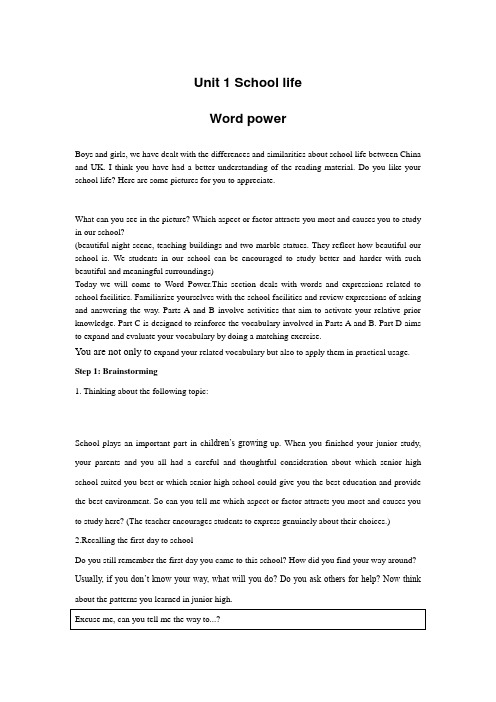
Unit 1 School lifeWord powerBoys and girls, we have dealt with the differences and similarities about school life between China and UK. I think you have had a better understanding of the reading material. Do you like your school life? Here are some pictures for you to appreciate.What can you see in the picture? Which aspect or factor attracts you most and causes you to study in our school?(beautiful night scene, teaching buildings and two marble statues. They reflect how beautiful our school is. We students in our school can be encouraged to study better and harder with such beautiful and meaningful surroundings)Today we will come to Word Power.This section deals with words and expressions related to school facilities. Familiarize yourselves with the school facilities and review expressions of asking and answering the way. Parts A and B involve activities that aim to activate your relative prior knowledge. Part C is designed to reinforce the vocabulary involved in Parts A and B. Part D aims to expand and evaluate your vocabulary by doing a matching exercise.You are not only to expand your related vocabulary but also to apply them in practical usage. Step 1: Brainstorming1. Thinking about the following topic:School plays an important part in chi ldren’s growing-up. When you finished your junior study, your parents and you all had a careful and thoughtful consideration about which senior high school suited you best or which senior high school could give you the best education and provide the best environment. So can you tell me which aspect or factor attracts you most and causes you to study here? (The teacher encourages students to express genuinely about their choices.)2.Recalling the first day to schoolDo you still remember the first day you came to this school? How did you find your way around? Usually, if you don’t know your way, what will you do? Do you ask others for help? Now think about the patterns you learned in junior high.3. Dealing with the mapFocus on the map first and familiarize yourselves with each building. Now read Wei Hua’s thoughts carefully and mark her routes on the map. Pay attention to Wei Hua’s expressions and try to learn the usage of these phrases.Step2: Vocabulary learning1. Dealing with BDeal with Part B individually according to the instructions and write a description of the quickest way to get from the dormitories to Classroom 4. Then report your answers to the class.2. Dealing with A and B for homeworkDeal with Part A on page 85 in Workbook. After reading the letter, you will know how to write a note to indicate the way to somewhere. (Part B as homework)3. Dealing with CRead Part C and complete it. You’d better consult each other or the dictionary whenever you havea problem before consulting me. Then report your answers. Pay attention to your pronunciationand spelling.C.4. Dealing with DHave ever been to a gym? If not, try to imagine what kinds of equipment are usually provided in a gym and why gyms are popular nowadays.( a. The teacher can play some videos for students to watch and meanwhile teach them how to say these pieces of equipment in English. Then ask students to finish Part D.b. If possible, take students to a gym to have the lesson. While teaching, the teacher can invite students to do some performances on the equipment and meanwhile the teacher instructs students in English how to use this equipment.c. Ask students to discuss the following questions: Do you think having a gym is an important factor for students when choosing a school? Why are more and more key schools spending a large amount of money in improving their school facilities? Do you think it is necessary for all schools to have this kind of equipment?)。
牛津译林版高中英语必修1Unit 2Growing painsword power教案1
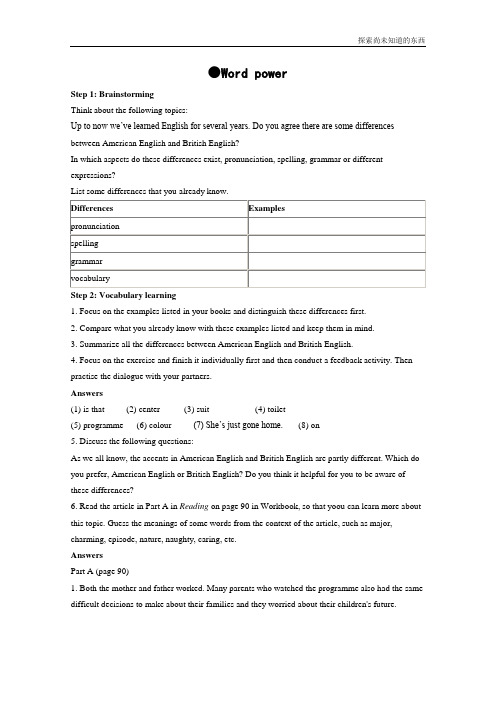
●Word powerStep 1: BrainstormingThink about the following topics:Up to now we’ve learned English for several years. Do you agree there are some differences between American English and British English?In which aspects do these differences exist, pronunciation, spelling, grammar or different expressions?List some differences that you already know.Step 2: Vocabulary learning1. Focus on the examples listed in your books and distinguish these differences first.2. Compare what you already know with these examples listed and keep them in mind.3. Summarize all the differences between American English and British English.4. Focus on the exercise and finish it individually first and then conduct a feedback activity. Then practise the dialogue with your partners.Answers(1) is that (2) center (3) suit (4) toilet(5) programme (6) colour (7) She’s just gone home.(8) on5. Discuss the following questions:As we all know, the accents in American English and British English are partly different. Which do you prefer, American English or British English? Do you think it helpful for you to be aware of these differences?6. Read the article in Part A in Reading on page 90 in Workbook, so that yoou can learn more about this topic. Guess the meanings of some words from the context of the article, such as major, charming, episode, nature, naughty, caring, etc.AnswersPart A (page 90)1. Both the mother and father worked. Many parents who watched the programme also had the same difficult decisions to make about their families and they worried about their children's future.2. He was naughty for being caught by the police and breaking his promise to his parents; but he was also caring and warm as he helped a homeless boy.3. Many teenage girls bought photos and posters of him and he was in many teen magazines.4. They felt disappointed when he was dishonest/did something bad but proud when he wascaring/did something good.5. The character Mike, and the fact that the family in the programme had similar problems to the people who watched the programme.Step 3: Vocabulary extension1. Focus on Part A and finish the exercise individually first. Then conduct a feedback activity. AnswersA 1. something easy to understand2. boring/ afraid to have fun3. listening carefully4. joke with someoneDo you know the meaning of the following sentences?2. Let’s continue with Part B, as there are more col loquialisms. Think over and discuss with each other first. If you still can't work out the meanings, consult the dictionary.Answers1. She is good at gardening.2. He is very clumsy.3.That is like criticizing someone else for a fault you have yourself.4. It is raining heavily.5. Don’t exaggerate something.ResourcesAmerican English and British English share a lot of similarities. However, there are still some differences. These differences are considered to be caused by several factors, such as different national histories, cultural development and the influences of local and regional idioms and expressions. Some words share the same pronunciation while their spellings vary a bit, for example, colour and color, cheque and check, realise and realize. In addition, different words are used to indicate the same thing. For example, ‘toilet’ in British English is ‘rest room’ in American English. Likewise ‘trousers’ are ‘pants’, ‘cooker’ is ‘stove’ and ‘angry’ is ‘mad’.。
高中英语(牛津译林版)必修一学案 Unit2 growing pains-Word power学案
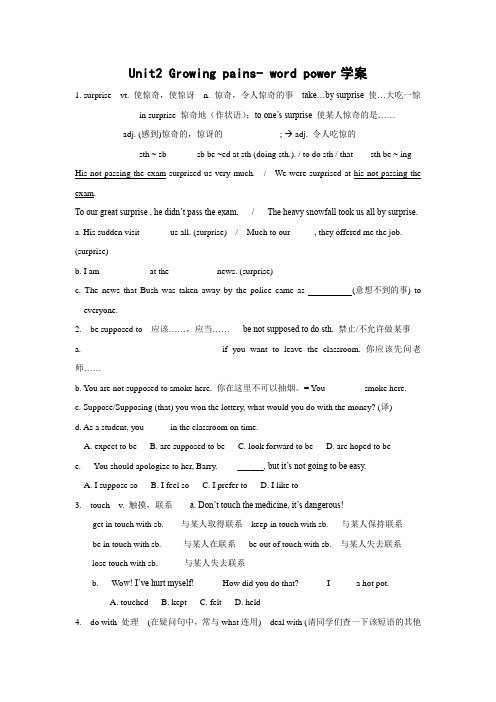
Unit2 Growing pains- word power学案1. surprise vt. 使惊奇,使惊讶n. 惊奇,令人惊奇的事take…by surprise 使…大吃一惊in surprise 惊奇地(作状语);to one’s surprise 使某人惊奇的是……adj. (感到)惊奇的,惊讶的_____________; adj. 令人吃惊的___________ sth ~ sb sb be ~ed at sth (doing sth.). / to do sth / that sth be ~ ing His not passing the exam surprised us very much. / We were surprised at his not passing the exam.To our great surprise , he didn’t pass the exam. / The heavy snowfall took us all by surprise.a. His sudden visit ______ us all. (surprise) / Much to our _____, they offered me the job. (surprise)b. I am ___________at the __________ news. (surprise)c. The news that Bush was taken away by the police came as __________(意想不到的事) to everyone.2. be supposed to 应该……,应当…… be not supposed to do sth. 禁止/不允许做某事a. ______________________________ if you want to leave the classroom. 你应该先问老师……b. You are not supposed to smoke here. 你在这里不可以抽烟。
- 1、下载文档前请自行甄别文档内容的完整性,平台不提供额外的编辑、内容补充、找答案等附加服务。
- 2、"仅部分预览"的文档,不可在线预览部分如存在完整性等问题,可反馈申请退款(可完整预览的文档不适用该条件!)。
- 3、如文档侵犯您的权益,请联系客服反馈,我们会尽快为您处理(人工客服工作时间:9:00-18:30)。
牛津高中英语教学设计单元:Unit 2 Growing pains板块:Word powerThoughts on the design:本节课是以听、说、读为主的词汇拓展教学课。
本节课的设计在教材原有的基础上增加了语言信息的输入:一方面提高了学生对语言的直观的感性认识;另一方面信息的选择也注重通过情感教育增加学生对语言的情感融入。
此外,本节课对于教材的处理有所侧重,并适当延伸。
在教授词汇知识和学习策略的同时,适当增加了词汇所蕴含的文化知识的输入。
整节课应当在师生的情感互动、学生的情感融入和师生共同的情感体验的过程中进行。
Teaching aims:After learning this session, the students will be able to know and recognize some differences between American and British English, and some colloquialisms as well. With this teaching design, the students will experience more differences between American and British language and culture. Besides, the students will obtain more cultural background information as well as more interest in English language and culture.Teaching procedures:Step 1Show a poster and introduce the movie «the Parent Trap».Show two questions about the movie: (1) What’s the difference between the twins? (2) Can you tell Annie from Hallie in the movie? Try to find the answers while watching the following movies and reading the texts concerned.[Explanation]本单元的主题是成长,因此向学生推荐这部有关成长的电影。
下面将通过视频与文本的形式具体讲述电影情节,因此此处只需简单介绍以引入下面的主题。
The Parent Trap, presented by Disney in 1998, tells a story of a pair of twins getting reunited after 11 years separation since birth. Lindsay Lohan elegantly played two main characters, the twins, one from the UK and the other from the USA.说明:在介绍过程中,教师宜强调双胞胎姐妹分别来自英国和美国,提醒学生留心两人语言上的差异。
也即随后的两个问题。
这两个问题只需提出而不需要学生回答,仅仅要求学生在下面欣赏和阅读的过程中思考。
Step 2Show the movies.Show the texts, and fill in the blanks according to the movies.Chapter I MeetingAt Maine Summer Camp, eleven-year olds Californian Hallie Parker and Londoner Annie James meet each other. Though they look surprisingly ________ to one another, they develop a ________ for each other, and attempt to play tricks on one another in a series of childish competitions. (alike, dislike)Chapter II RealizationFinally, both girls are punished to stay together in an isolation cabin, where they learn that they have much in ________. They then realize that they are in fact ________ sisters that were separated at birth. They each have one half of the same photograph, a wedding picture that their _________ took eleven years and nine months ago. (common, twin, parents)Chapter III PlanDesperately wanting to meet the other parent they’ve n ever seen since ________, the sisters hatch a plan: Hallie will return to London ________ as Annie, and Annie will return to California as Hallie. Of course, the plan will eventually be __________, and the two girls imagine their parents having to meet after 11 years in order to change them back. (birth, acting, discovered)Chapter IV DiscoveryAfter some training lessons, where they each learn about one another, they head 'home' separately, and the plan begins. Due to their slightly different ________, and their greatly different manners, they are soon discovered one after another. With the help of others, they continue with their plan to bring their parents back together again. (language)Chapter V Re-unionIn the end, of course, they _______ in bringing the whole family together as one. (succeed)[Explanation]PPT第5到14页是一个整体,通过该电影的几段剪辑和文字叙述简单地介绍了这个故事。
电影片段的播放只需要单击电影画面即可。
文本部分的填空简单检测学生对所看内容的掌握。
整个故事分了五个章节:第一章“meeting”是两姐妹相会;第二章“realization”是姐妹俩发现真相;第三章“plan”是姐妹俩策划交换身份的情节;第四章“discovery”有两段剪辑,分别介绍俩姐妹各自被发现的过程;第五章“re-union”没有视频,直接通过文字介绍故事结局。
整个过程教师宜以口述来过渡五个部分,并适当加入情感因素。
Step 3Finish the exercise of true or false.1) Annie is from the USA while Hallie is from the UK. (F)2) They’ve never met each other before. (T)3) They recognize one another at the first sight. (F)4) They each have one half of the same picture. (T)5) According to their plan, Hallie will go to California, and Annie, London. (F)6) The language they speak is completely different. (F)[Explanation]这部分是对故事内容的回顾检测。
Step 4Show the two questions at the beginning of the class: (1) What’s the difference between the twins? (2) Can you tell Annie from Hallie in the movie? Ask students to discuss about them.Annie Halliefrom London, UK California, USAlanguage British English American Englishexamples give me a fright scare me dizzy woozyMy God! [ɒ] My God! [ɑː][Explanation]此时对于前面提出的两个问题,学生应该心里有数了,但是仍然很难用语言来表述清楚。
因此,紧接着的表格简化问题,易于学生回答。
并且,通过这个表格,教师可以自然过渡到本课的第二个主题:“American English vs British English”。
Step 5Introduce the differences between American and British English from four aspects: grammar, spelling, vocabulary and pronunciation.Show examples of the differences one by one. (students’ book page 26)[Explanation]PPT第18到24页分别从语法、拼写、词汇和语音四个方面介绍了英美英语的不同之处,并分别举例。
